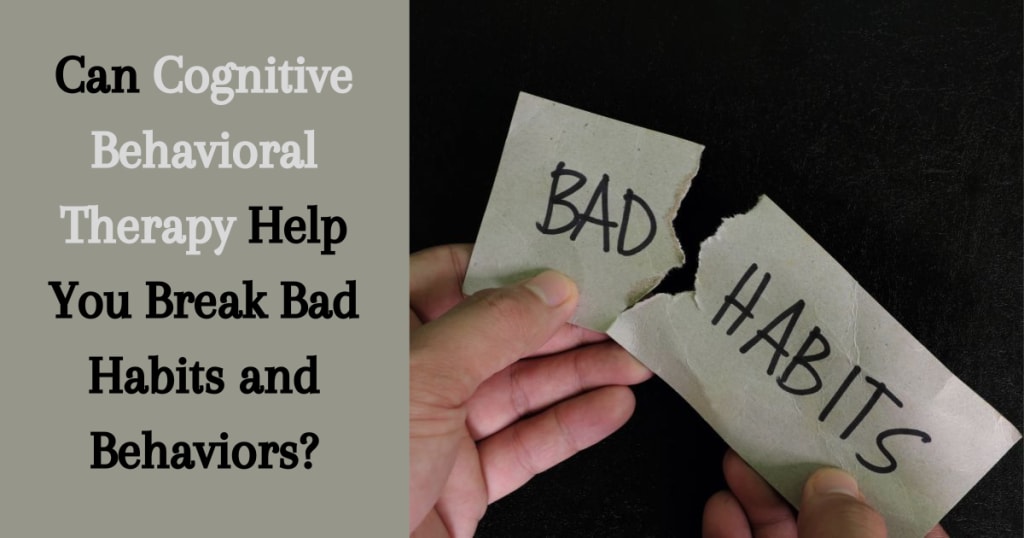Can Cognitive Behavioral Therapy Help You Break Bad Habits and Behaviors?
CBT Therapy Habits

Bad habits and behaviors are common among people of all ages and backgrounds. Whether it's smoking, overeating, procrastination, or excessive drinking, bad habits can negatively impact our health, relationships, and overall quality of life. Fortunately, In NYC there are various techniques and therapies available that can help individuals break free from these behaviors. Cognitive-behavioral therapy in NYC has been found to be effective in helping people change their bad behaviors.
Understanding Cognitive Behavioral Therapy
CBT is a kind of psychotherapy that aims to change distorted patterns of thinking and behavior by identifying and challenging irrational thoughts. It is based on the idea that our thoughts, feelings, and behaviors are interconnected and that altering one can affect others. The goal of CBT is to help individuals become aware of their negative thoughts and beliefs, challenge them, and replace them with more positive and realistic ones.
Breaking Bad Habits
One of the ways in which CBT can help individuals break bad habits is by addressing the underlying thoughts and beliefs that contribute to these behaviors. For example, if someone is struggling with overeating, a CBT therapist would help them identify the negative thoughts and beliefs they have about food and their body. These beliefs could include "I can't control my eating" or "I need to eat to cope with stress." Once these beliefs are identified, the therapist would work with the individual to challenge them and replace them with more positive and realistic ones, such as "I have control over my eating" or "I can find healthier ways to cope with stress."
CBT can also help individuals break bad habits by teaching them new coping skills and behaviors. For example, if someone is struggling with procrastination, a CBT therapist would help them identify the triggers that lead to their procrastination and teach them new coping skills, such as breaking tasks into smaller, more manageable steps or setting specific goals and deadlines.
Identifying the Root Cause of Bad Habits and Behaviors
One of the key aspects of CBT is identifying the root cause of negative thought patterns and behaviors. This process involves examining the individual's beliefs, attitudes, and experiences that may have contributed to the development of the habit.
For example, a person who struggles with alcohol addiction may have developed the habit as a coping mechanism for stress or trauma. In this case, CBT would focus on identifying the underlying causes of the addiction and developing healthy strategies to replace them. If you're looking for a CBT therapist in NYC who specializes in addiction treatment, you may also want to search for dbt therapists in NYC to help you with the same.
The Role of Mindfulness in CBT
Mindfulness is a key component of CBT and can also be helpful in breaking bad habits. Mindfulness involves being more aware of one's thoughts, feelings, and bodily sensations in the present moment without discernment. By practicing mindfulness, individuals can become more aware of the triggers that lead to their bad habits and learn to respond to them in a more constructive way.
For example, a mindfulness therapist can work with a client who wants to quit smoking by helping them to focus on the physical sensations and urges they experience when they feel the urge to smoke. By observing these sensations without judgment, they can learn to respond to them in a more positive way, such as taking a deep breath or going for a walk.
The Effectiveness of CBT
Numerous studies have found CBT to be effective in treating a range of mental health conditions, including anxiety, depression, and substance abuse. A study published in the journal Addictive Behaviors found that CBT was more effective than a control group in helping individuals quit smoking. Another study published in the journal Clinical Psychology Review found that CBT was effective in helping individuals with binge-eating disorder.
For example, In New York City, individuals who struggle with procrastination can benefit from CBT therapy. CBT therapy NYC can help individuals develop new habits and behaviors that support their goals and aspirations.
Final Thought
Breaking bad habits and behaviors can be challenging, but CBT can be an effective tool in this process. By addressing the underlying thoughts and beliefs that contribute to these behaviors, teaching new coping skills and behaviors, and incorporating mindfulness practices and Stress Management Programs in some cases, CBT can help individuals break free from their negative patterns and improve their overall quality of life. If you are struggling with a bad habit or behavior, consider seeking out a qualified CBT therapist to help you on your journey toward positive change.
About the Creator
Drlisana Politano
Looking for the best cognitive behavioral therapist in NYC? Get the best services from one of the best psychologists Dr. Lisa Napolitano. She is offering anxiety, depression, ADHD, emotional regulation, and many more.






Comments
There are no comments for this story
Be the first to respond and start the conversation.